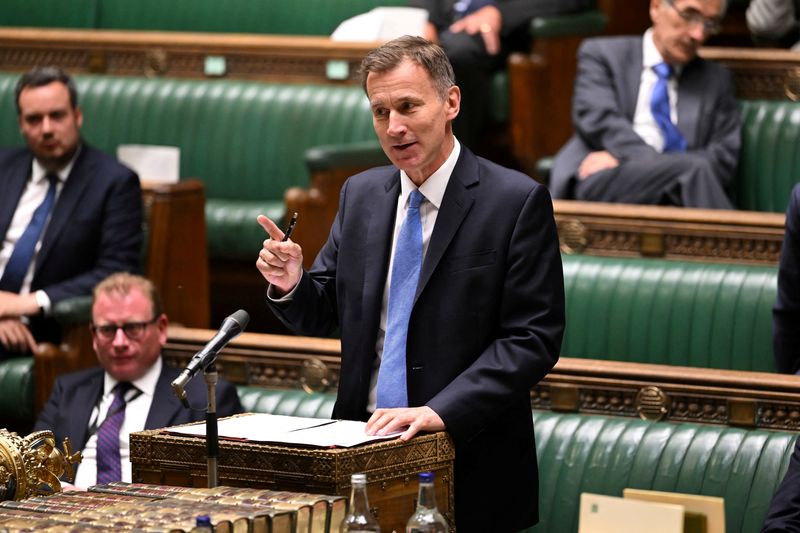By Sinead Cruise and Carolyn Cohn
LONDON (Reuters) - Britain's financial services industry has broadly cheered fresh government proposals to jumpstart the economy by channelling 50 billion pounds ($64.5 billion) of pension fund cash into fledgling firms, but the plans could backfire on savers, experts said.
Finance minister Jeremy Hunt on Monday unveiled a raft of reforms aimed at redirecting a greater proportion of a 4.6 trillion pound pool of capital managed by Britain's pensions and insurance sectors into unloved UK assets by 2030.
The so-called Mansion House Reforms follow years of dwindling support for British companies by several major institutional investors, and concerns in some quarters that the City financial district is struggling to remain competitive as a global finance centre after Brexit.
The government rocked pension savers last September with a fiscal statement that drove government bond yields higher and forced pension schemes to scramble for cash, triggering a parliamentary inquiry into their investments.
Aviva (LON:AV), Legal & General and seven other pension firms have agreed non-binding terms to invest at least 5% of defined-contribution pension savings in unlisted companies by the start of the next decade, moves seen as critical to supporting cash-strapped entrepreneurs.
Richard Gnodde, CEO of Goldman Sachs (NYSE:GS) International, said the reforms would make the UK more attractive to capital and talent and lead to upgrading of skills across both the broader economy and the financial sector.
But others said the proposals were little more than a shot in the dark.
"The government suggests that the approach will lead to an 'everyone's a winner' scenario, in which retirees get bigger pension pots and innovative UK companies get the capital they need to grow," said Becky O’Connor, Director of Public Affairs at PensionBee.
"There are no guarantees this win-win result will play out."
The government is under pressure to revitalise domestic investor interest in several industries considered key to Britain's growth, including fintech, biotech, life science and clean technology.
At the same time, millions of Britons who save into so-called defined contribution pension schemes are heading towards retirement outcomes that are worse than those of their parents' generation, consultants say, after years of inefficient investing in ultra-low risk assets.
Encouraging greater investment in growth assets will help younger savers but the reforms offer little hope to those retiring in the near term.
"Our modelling has shown that many of these people will not be able to afford even a moderate standard of living in retirement," Jon Hatchett, senior partner at Hymans Robertson, said.
Inflation continues to ravage Britain's economy, with rates running higher than in any other major rich country.
Interest rate futures on Monday pointed to a peak in official interest rates of between 6.25% and 6.5% in early 2024 which would be the highest in 25 years and up from 5% now.

Bank of England Governor Andrew Bailey said on Monday the central bank had to "see the job through" but there are fears that recession could be the only way to bring consumer price growth back under control.
"The Chancellor (Hunt) has announced areas of focus which represent a positive step forward, should boost UK attractiveness, and will benefit the economy, but as ever, success can only be measured on actions," Anna Anthony, UK Financial Services Managing Partner at EY, said.